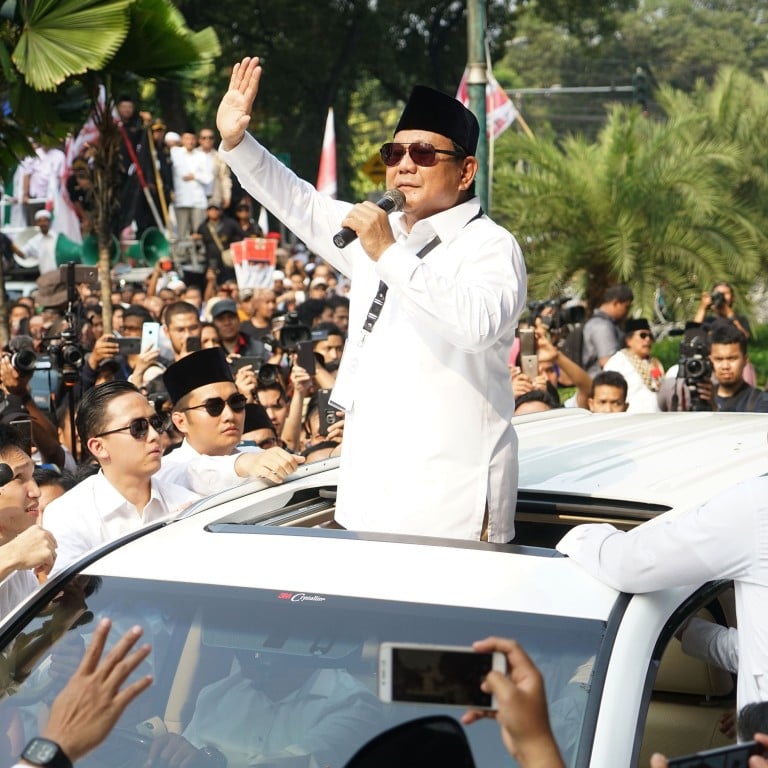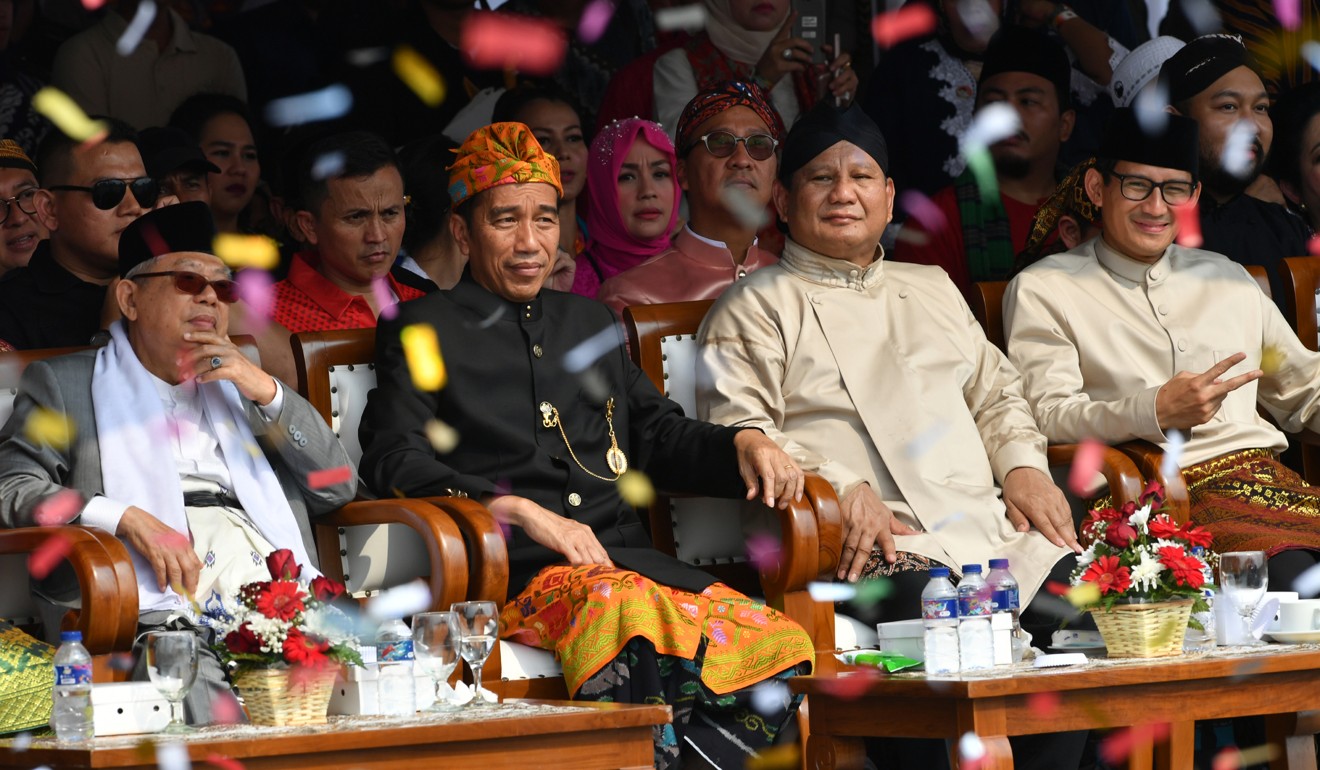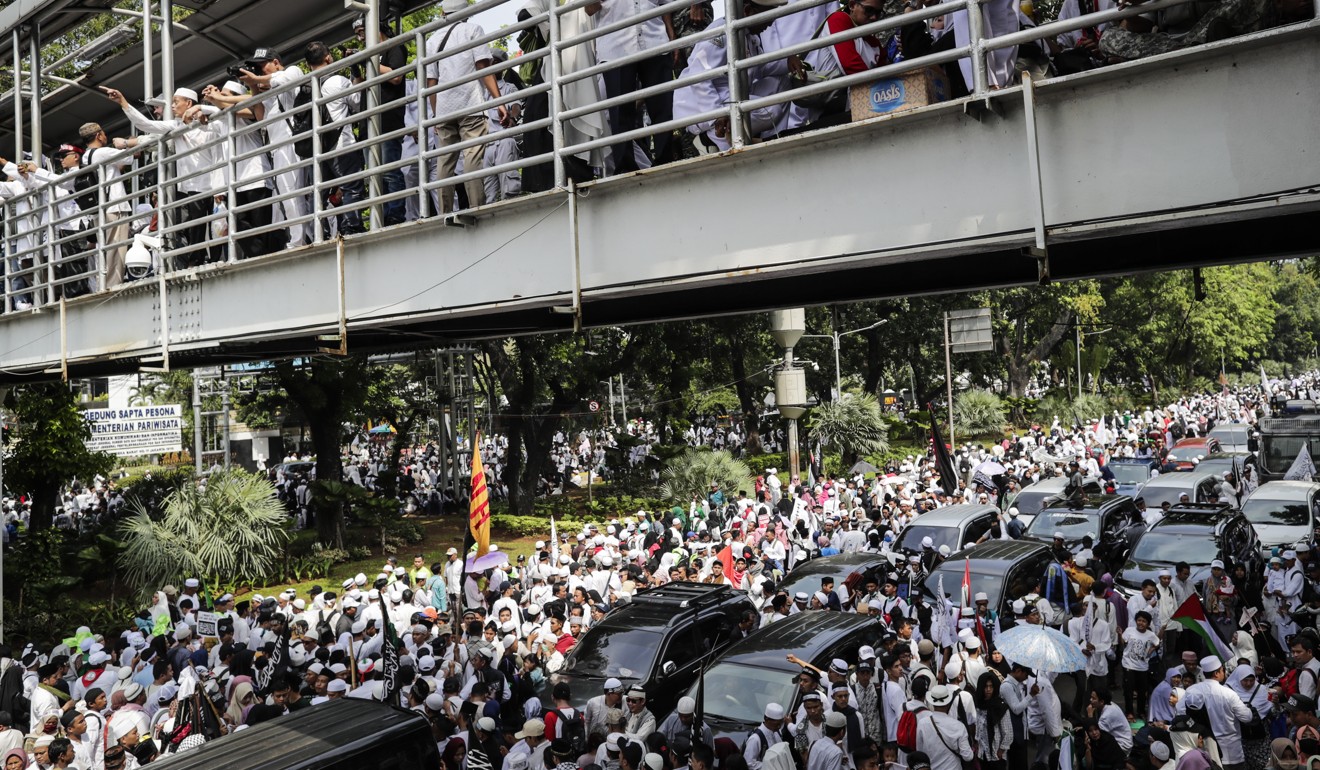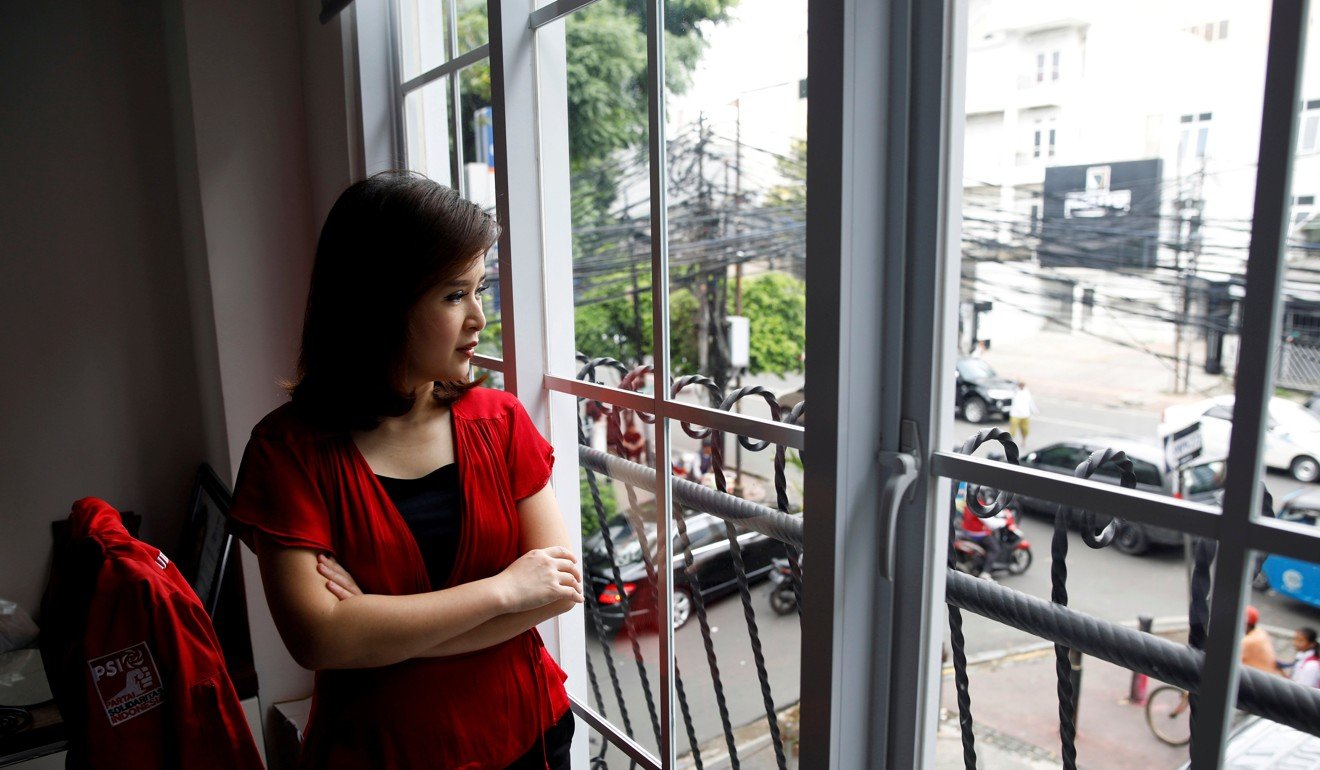
Indonesia’s Prabowo Subianto plays to Muslim voters in a twist of faith before election
- The presidential candidate is trying to cultivate an image as a pious Muslim before taking on incumbent Joko Widodo in the April 17 election
- The approach may be effective in regions such as Aceh where faith plays a significant role, but is it enough to sway other voters?
The former general is facing President Joko Widodo in the polls, a repeat of 2014 when he lost to Widodo by a margin of just 6 per cent. This time, he is claiming that Indonesia under Widodo has seen ballooning foreign debt and would not last more than three days if it were caught up in a war due to a lack of bullets in its arsenal.
Indonesia’s election showdown: Prabowo woos ethnic Chinese, Jokowi banks on distaste for his competitor
His running mate, renowned entrepreneur and former Jakarta vice-governor Sandiaga Uno, stood beside him throughout the speech.
Prabowo also repeatedly vowed to protect all religious leaders, chief among them Muslim clerics, citing their significant contribution to the four-year fight to win the country’s independence from the Netherlands after it was proclaimed on August 17, 1945.
“We will guarantee the respect our ulema deserve, and their right to be free from criminal threats. This will be very significant … because the role of the ulema in our fight for independence was also monumental,” he said. “As Indonesians we shall not disrespect our Islamic leaders, our ulema, and other religious leaders among us.”

The presidential candidate went on to declare his protection for religious groups whose tenets aligned with the country’s constitution and state ideology Pancasila, a move analysts perceived as a sly jab at Widodo’s decision to dismiss radical group Hizbut Tahrir, which aimed to establish an Islamic caliphate in Indonesia. In 2017, Widodo issued a regulation removing the courts’ role in disbanding organisations deemed unlawful by the government, allowing his administration to do so unilaterally.
“We will also guarantee … that all organisations upholding the Pancasila and the 1945 Constitution of the Republic of Indonesia shall not be stigmatised and judged without proper trial,” Prabowo said.
He then vowed to increase the quality of religious schools in the country, as well as to establish a haj-focused financial institution and to negotiate with the government of Saudi Arabia to allow Indonesia to build its own accommodation there for pilgrims.
Indonesia to review China’s belt and road projects if Prabowo beats Widodo in presidential election
“Islam in Indonesia is a blessing from God, so don’t try to stigmatise a certain group. If you hear takbir [Allahu akbar, or “Allah is Great”], that is not a threat aimed at anyone. Takbir is to glorify our beloved God. The Christian is welcome to [shout] Hallelujah. Being religious doesn’t mean being extreme or a fanatic,” Prabowo said.
Prabowo eventually ended the speech by shouting Allahu akbar three times, which was met with loud cheers from the audience of hundreds.
Analysts say Prabowo’s emphasis on Islam is a ploy to win Muslim voters as he tries to sway them from voting for Widodo, who picked Muslim scholar Ma’ruf Amin as his running mate. “I think that’s Prabowo’s way of signalling to his supporters who were from the 212 movement,” said Arya Fernandes, political researcher at Jakarta’s Centre for Strategic and International Studies (CSIS), referring to the group of Muslim hardliners that rallied for the downfall of former Jakarta governor Basuki Tjahaja Purnama, an Chinese Christian also known as Ahok in December 2016.

“He wanted to give the impression that he is a pious Muslim, but I think the strategy wouldn’t be effective to sway undecided voters. It’s no longer enough now to gain votes by using religious language and shouting takbir in the campaign,” Arya said.
The so-called 212 movement has resulted in an informal alliance between political opportunists and Muslim hardliners, and they have been active in the current election cycle. In November, similar forces mobilised to protest the burning of the Hizbut Tahrir flag, which they claimed contained an Islamic verse; the same month, a 212 movement member reported Indonesian-Chinese politician Grace Natalie, a Christian, to the police after she declared her party would not support discriminatory local laws based on the Koran or the Bible.
The most extreme demand will be to turn Indonesia into an Islamic country
Prabowo’s move to align himself with Muslim hardliners is seen as the cheapest tool to shore up support as his campaign has raised fewer funds in this year’s elections compared with 2014, analysts said. This conservative backing of Prabowo has some political watchers pondering whether Indonesia’s relatively young democracy would be at risk should he win, as his supporters might push for the implementation of Islamic law in the country’s judicial system.
“There are two opinions about Prabowo’s Islamic backing. One says that he is just manipulating these groups to support him and that his alliance with them is just posturing, while the other says that if he does win, these groups will have demands for him and he will be required to respond to those demands,” said Alexander Raymond Arifianto, researcher with the Indonesia Programme at the S. Rajaratnam School of International Studies at Singapore’s Nanyang Technological University.
Some of these requests could include restriction against the construction of non-Muslim worship places and non-Muslims becoming political leaders, he added.
“The most extreme demand will be to turn Indonesia into an Islamic country,” Arifianto said.
Prabowo vs Widodo: what makes general think Indonesian election will be a case of second time lucky?
Prabowo’s attempt to shore up his religious credentials was confirmed by his running mate Sandiaga Uno in November.
“Prabowo is a Muslim but not a pious Muslim … he has openly said that he is Muslim only [on his] identity card, and now he’s learning to be more pious,” Uno said during a panel held by the Jakarta Foreign Correspondents Club, adding that the pair would respect all religions.
Nearly all recent poll estimates have placed Prabowo behind Widodo. Jakarta-based pollster LSI, for example, put Widodo-Amin ahead with 53.2 per cent of the vote, compared with Prabowo-Uno’s 31.2 per cent. According to analysts, the opposition’s position as laggards might drive them to play on voters’ emotional attachment to religion.

“Many Muslims are still bitter because the government accused them of being radical. The banning of Hizbut Tahrir further divides Muslim voters,” said Pangi Syarwi Chaniago, executive director at Jakarta-based think tank Voxpol Centre Research and Consulting.
“Muslim voters are the priority for all presidential contenders in Indonesia, so it’s no surprise that they are trying to get these votes by building an image of themselves as a pious Muslim,” he said.
“A lot of people disagree with Hizbut Tahrir’s mission in Indonesia, but many also disagree with how Widodo dealt with the group, which may seem authoritarian to some.”
Religion-heavy speech might work on voters in regions where faith plays a significant role in society, such as Aceh. The country’s northernmost province is the only region in Indonesia that implements sharia law, and it has been trying to get both presidential and vice-presidential candidates to compete in a Koran reading competition there. Neither Widodo nor Prabowo have explicitly agreed to the invitation.
How price of sugar could swing the Indonesian election (and it’s bittersweet for Joko Widodo)
“To be president or vice-president, a person must possess a lot of leadership qualities, but for us Muslims, the ability to read the Koran is very important,” said Marsyuddin Ishak, head of the Aceh Ulama Association and organiser of the contest. “Aceh is a special region, we have a local regulation that requires every political contender to be able to read the Koran, if not they would be disqualified. The Indonesian president will also lead Aceh, so we have the right to know their degree of faith. One way of doing this is through their ability to read the Koran, although it’s not the only measure.”
The effectiveness of Prabowo’s speech on Muslim voters is yet to be seen, but his vow to protect Muslim leaders seems to be working on voters such as Ishak.
“His good intention [to protect Muslim leaders and organisations] might be one indicator of being a pious Muslim, we support it because it’s for the good of the nation,” Ishak said. “But we in Aceh still question all the candidates’ degree of Islamic faith, except for cleric Ma’ruf.” ■

